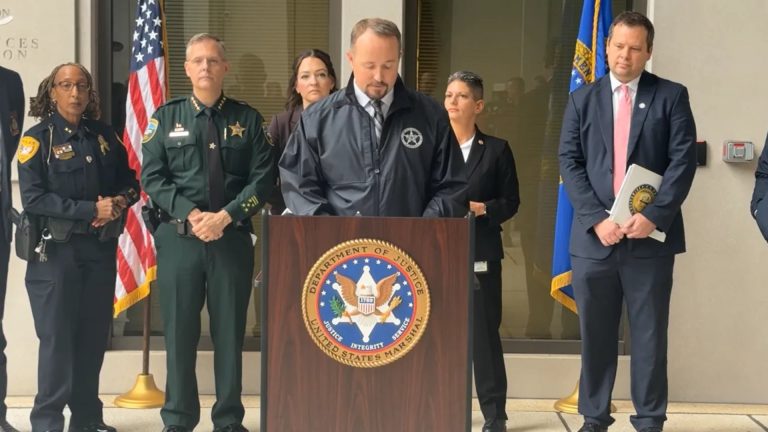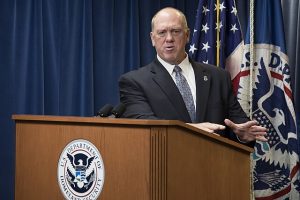In a development that has reignited debates over immigration enforcement, environmental protection, and the balance of federal and state authority, the U.S. Court of Appeals for the 11th Circuit has granted a stay allowing Florida to continue operating its highly controversial migrant detention facility deep in the Everglades. Known by its critics and supporters alike as “Alligator Alcatraz,” the remote site had faced suspension after a federal judge ruled in August that it violated federal environmental law. The appellate court’s decision, however, clears the way for construction and operations to resume while litigation continues, ensuring the facility remains at the center of political and legal controversy.
The Facility and Its Origins
“Alligator Alcatraz” is the nickname given to Florida’s migrant detention center built on a former military airfield surrounded by alligator-infested waters. The isolation of the location has been touted by Florida officials as a security advantage, making escapes virtually impossible and limiting outside interference. The facility was developed under Governor Ron DeSantis’ administration as a state-driven project to expand detention capacity amid rising migrant encounters. The Trump administration also voiced support, arguing the center would relieve pressure on overcrowded federal detention sites.
Attorney General James Uthmeier described the project as an “innovative solution” to what Florida considers a federal failure on immigration enforcement. By partnering with the Department of Homeland Security (DHS), state leaders intended for the facility to become a cornerstone of cooperative immigration management. Yet from the start, the project drew fierce opposition from environmental advocates, Indigenous groups, and immigrant rights organizations who raised alarms about both ecological damage to the Everglades and the treatment of detainees.
Judge Williams’ Ruling
On August 7, U.S. District Judge Kathleen Williams, appointed under the Obama administration, issued a temporary restraining order halting new detentions and freezing construction. Citing the National Environmental Policy Act (NEPA), Williams argued that the government had failed to conduct a necessary environmental impact statement. The ruling forced transfers of migrants to other detention centers across Florida and temporarily halted expansion plans at the Everglades site.
Environmental groups including Friends of the Everglades, the Center for Biological Diversity, and the Miccosukee Tribe of Indians supported the challenge. They warned that building and operating a large-scale detention facility in a fragile ecosystem risked irreparable harm to wildlife habitats, water systems, and cultural sites.
Appeals Court Intervention
Florida state officials and DHS quickly appealed the decision, arguing that Williams had overstepped by interfering with state property rights and law enforcement operations. On September 4, a divided three-judge panel of the 11th Circuit agreed to stay her ruling. Judges Barbara Lagoa and Elizabeth Branch, both appointed during Republican administrations, wrote that while environmental harms were not dismissed outright, the immediate need for public safety and immigration enforcement outweighed them in this preliminary stage.
“After careful consideration, we grant the defendants’ motions and we stay the preliminary injunction and the underlying case itself pending appeal,” the panel stated. Their decision reinstates the ability of Florida to detain migrants at the site and to continue construction efforts while the broader legal case works its way through the courts.
Judge Charles Wilson, appointed under President Bill Clinton, dissented, expressing concern that bypassing NEPA review set a troubling precedent for federal-state projects with potential environmental impact.
Political Responses
Governor DeSantis celebrated the ruling as a victory against what he framed as judicial activism. “Some leftist judge ruled implausibly that somehow Florida wasn’t allowed to use our own property to help the federal government in this important mission because they didn’t do an environmental impact statement,” DeSantis said at a press conference. “Well, we said we would fight that … and I’m pleased to say that the 11th Circuit has just stayed that ruling. So Alligator Alcatraz is, in fact, open for business.”
He further accused critics of spreading misinformation about the facility’s closure. “The media was giddy that somehow Alligator Alcatraz was shutting down. That wasn’t true. We continued deportations, and now the court has confirmed our right to proceed.”
DHS also welcomed the outcome, calling it a “win for the American people” and emphasizing the facility’s role in expanding detention capacity at a time of high border apprehensions. Trump administration officials likewise supported the decision, framing it as consistent with their broader push for stricter immigration enforcement.
Environmental and human rights advocates, however, reacted with outrage. The Center for Biological Diversity accused the court of ignoring clear legal requirements designed to protect the Everglades, while the Miccosukee Tribe reiterated its opposition, highlighting the cultural and ecological importance of the site.
Broader Implications
The case has quickly become about more than just one detention facility. At stake are broader questions about the scope of state authority in immigration enforcement, the application of federal environmental law, and the role of courts in checking executive power. If the appeals court ultimately upholds Florida’s position, it could embolden states to pursue their own detention initiatives without federal environmental reviews, provided they maintain technical independence from Washington funding streams.
Legal scholars note that the appeals panel’s reasoning centered on the fact that no clear evidence of federal funding or binding reimbursement agreements was presented. That distinction allowed the court to treat “Alligator Alcatraz” as primarily a state initiative rather than a federal project, even though DHS remains a partner in operations.
Critics’ Concerns
Beyond environmental issues, critics argue that placing detainees in such an isolated facility raises human rights and oversight concerns. The nickname “Alligator Alcatraz” may capture the site’s security appeal to supporters, but for opponents it symbolizes cruelty and neglect. Concerns have been raised about access to legal counsel, healthcare, and adequate living conditions, given the remote location and limited accessibility.
Immigrant rights organizations fear the ruling could encourage a trend toward increasingly remote and securitized detention practices. “By design, this facility makes it nearly impossible for detainees to access outside support,” one advocate argued. “It is isolation disguised as security.”
What Comes Next
The appeals court ruling is not the final word. The case will now proceed through the full appeals process, where the core legal question will be whether Florida and DHS circumvented federal environmental law in establishing the detention facility. If the appellate court ultimately upholds Judge Williams’ original decision, Florida could be forced to shut down or significantly alter operations at “Alligator Alcatraz.”
For now, the stay means the facility remains operational and continues to expand. Migrants can once again be detained at the site, and construction crews have resumed their work. Meanwhile, environmental groups and human rights advocates are preparing to press their case at the next stage of litigation.
Conclusion
The saga of “Alligator Alcatraz” encapsulates the fierce political and legal battles defining immigration policy in 2025. To its supporters, the facility is a symbol of Florida’s determination to act where they believe the federal government has failed. To its opponents, it is a reckless gamble that sacrifices environmental integrity and human dignity for the sake of political posturing.
As the legal fight continues, the Everglades facility remains both a literal and symbolic battleground. Whether “Alligator Alcatraz” becomes a permanent fixture of Florida’s immigration enforcement landscape or a cautionary tale of overreach will depend on the courts’ next moves — and on the enduring clash between state ambition, federal law, and the fragile ecosystems caught in between.

James Jenkins is a celebrated Pulitzer Prize-winning author whose work has reshaped the way readers think about social justice and human rights in America. Raised in Atlanta, Georgia, James grew up in a community that instilled in him both resilience and a strong sense of responsibility toward others. After studying political science and creative writing at Howard University, he worked as a journalist covering civil rights issues before dedicating himself fully to fiction. His novels are known for their sharp, empathetic portraits of marginalized communities and for weaving personal stories with broader political realities. Jenkins’s breakout novel, Shadows of Freedom, won national acclaim for its unflinching look at systemic inequality, while his more recent works explore themes of identity, resilience, and the fight for dignity in the face of oppression. Beyond his novels, James is an active public speaker, lecturing at universities and participating in nonprofit initiatives that support literacy and community empowerment. He believes that storytelling is a way to preserve history and inspire change. When not writing, James enjoys jazz music, mentoring young writers, and traveling with his family to explore cultures and stories around the world.









